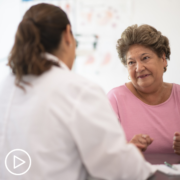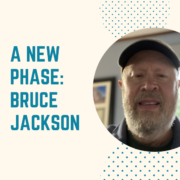Developing Research and New Myeloma Treatment Options
Developing Research and New Myeloma Treatment Options from Patient Empowerment Network on Vimeo.
What are the new developments in myeloma treatment and research? Dr. Brandon Blue discusses how the landscape of myeloma care has changed in recent years and treatment options for high-risk myeloma, and he shares developing research that patients should know about.
Dr. Brandon Blue is Assistant Member and Clinical Instructor in the Department of Malignant Hematology at Moffitt Cancer Center in Tampa, FL. Learn more about Dr. Brandon Blue.
Related Resources:

What Myeloma Patients Need to Know About Bispecific Antibodies |

Myeloma CAR T-Cell Therapy: How Does It Work and What Are the Risks? |

|
Transcript:
Katherine Banwell:
Dr. Blue, the landscape of myeloma care has changed significantly in recent years. Are there new factors to consider when working with a patient to choose a treatment approach?
Dr. Brandon Blue:
Yeah. The good thing about myeloma is it’s literally always changing, and that’s a great thing. Compared to some of the other cancers, or really even other diseases, sometimes we’ve been using the same things since the ‘90s. But luckily for myeloma every couple years we get something that’s bigger, and typically better. So, right now some of the new things that are available for patients are all the way from newly diagnosed, all the way to people who have relapsed disease. So, we have a lot of different options that we can potentially go into.
Katherine Banwell:
Dr. Blue, what treatment options are available for myeloma that’s considered high-risk?
Dr. Brandon Blue:
Yeah. So, unfortunately, there’s some people who have multiple myeloma whose disease does not follow the standard pattern. Unfortunately, what happens is that there are certain mutations that actually happen in the biology of those cancer cells that actually cause them to survive when they should be dying. And unfortunately, that means that sometimes the chemotherapy and the medicines that we give them becomes a little bit more resident.
A lot of times when we give people treatment the one question they ask is, “How long will it last?” But, unfortunately, there’s some people who have those high-risk features that unfortunately, despite whatever numbers we tell them of how long it may last, theirs actually may last a little bit shorter, and the disease may come back a little bit quicker. So, what we have to do as the doctors, and as the team, taking care of these patients is maybe do things a little bit more outside of the box, and do things that might tend to be a little bit more aggressive.
Because sometimes we have to match the aggressiveness of the disease. If the cancer itself is starting to be high-risk or aggressive, sometimes we may have to do some nontraditional things to kind of make sure that they have a good outcome and a good result.
Katherine Banwell:
Dr. Blue, is there developing research that myeloma patients should know about? And what are you hopeful about?
Dr. Brandon Blue:
Yeah. One of the things that happens right now is that we have CAR T that’s available for patients got approved by the FDA. However, the CAR T product that we currently have available only have one target, which is called the BCMA, or B-cell maturating antigen.
Which is part of the plasma cells, however, there are so many other targets on the plasma cells that potentially can be targets for new medications. And the good thing is that there are actually new CAR T and medications that are being developed that actually target other things other than the BCMA.
So then, it may come to the point where people get more than one CAR T down the road, and I think those are exciting clinical trials. Because if there’s multiple targets, and there’s multiple CAR T, maybe we can sequence them in a way that maybe we find a cure for the disease one day.
Katherine Banwell:
That’s exciting.
Dr. Brandon Blue:
It is.
Katherine Banwell:
Dr. Blue, thank you so much for joining us. Do you have anything else you’d like to mention?
Dr. Brandon Blue:
I just want people to know that it’s okay to get a second opinion. I think that regardless of what’s happening in your care, sometimes it’s always good just to have someone, especially someone who’s what they call a myeloma specialist, to review your case, and just make sure that you’re on the right road, and that things are going well for you. So, it’s something that I would recommend for anyone to do.










